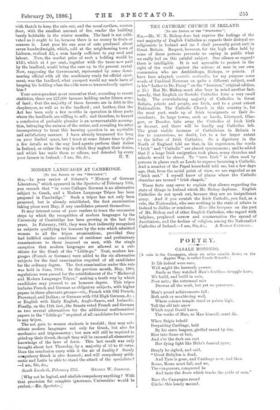THE CATHOLIC CHURCH IN IRELAND. [To THE EDITOR OF THE
nseserAzos."]
Sia,—Mr. W. N. Bishop does but express the feelings of the vast majority of English Catholics as regards their disloyal co- religionists in Ireland and (as I shall presently point out) in Great Britain. Respect, however, for the high office held by some of these persons prevents us saying in public what we really feel on this painful subject. Our silence as regards them is intelligible. It is not agreeable to protest in the sight of the world against the actions of men in our own
communion who are Archbishops, Bishops, or priests. (I have here adapted, mutatis mutandis, for my purpose some
words of Cardinal Newman on quite a different subject, used in his "Letter to Dr. Pusey " on the " Irenicon," original edition, p. 25.) But Mr. Bishop must also bear in mind another fact, namely, that English (or Scotch) Catholics form a very small body. The overwhelming majority of Catholics in Great Britain, priests and people, are Irish, and to a great extent Nationalists. The Catholic Church in this country is, for the most part, made up of Irish immigrants or their de- scendants. In large towns, such as Leeds, Liverpool, Glas- gow, or Dundee, take away the Catholics of Irish birth or descent, and there will be hardly any Catholics left.
The great visible increase of Catholicism in Britain is due to conversions, no doubt, but to a far larger extent to the influx of Irish Catholics. So a dignitary in the North of England told me that, in his experience, the words "Irish" and " Catholic " are almost synonymous ; and he added that if a large Irish emigration took place, many churches and schools would be closed. To "turn Irish" is often used by persons in places such as Leeds to express becoming a Catholic.
And a member of the Papal household told me, but a few days ago, that, from the social point of view, we are regarded as an "Irish sect." I myself know of places where the Catholic churches are termed "Irish chapels."
These facts may serve to explain that silence regarding the state of things in Ireland which Mr. Bishop deplores. English Catholics do not speak out, because they are an insignificant army. And if you scratch the Irish Catholic, you find, as a rule, the Nationalist, who sees nothing in the state of affairs in
Ireland to dislike or condemn. Hive ince lacrymce on the part of Mr. Bishop and of other English Catholics, who regard With helpless, perplexed sorrow and consternation the spread of Jacobinism, and the decline of religion, among the Nationalist
Catholics of Ireland.—I am, Sir, &c., A. Rom.tx CATHOLIC.


































 Previous page
Previous page